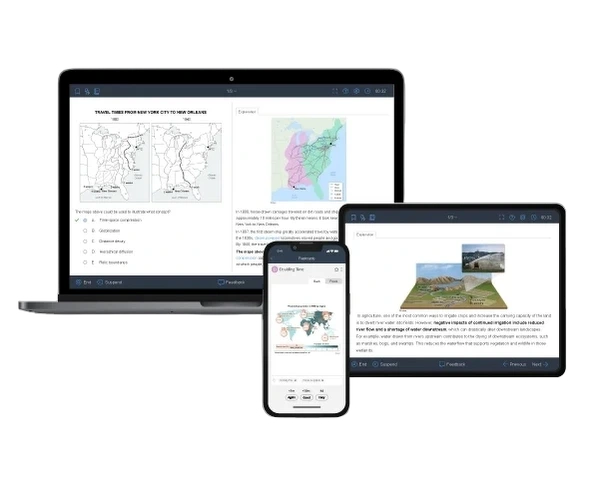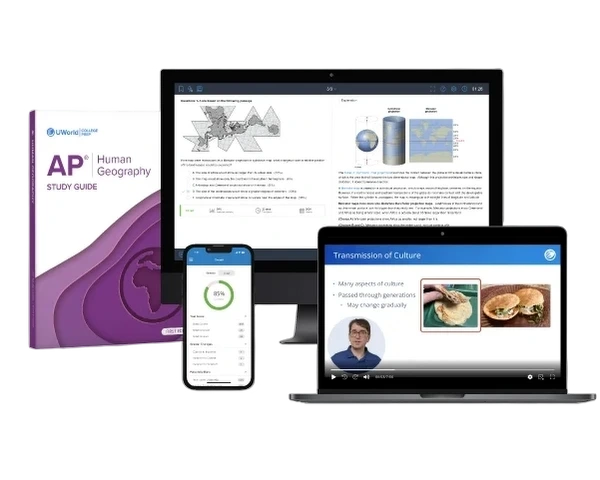AP® Human Geography (HUG) is an expansive course that explores the patterns and processes by which societies have interacted with the Earth's surface over time. Preparing for the AP HUG exam is a year-long process, but it is manageable when divided into small chunks.
How To Prepare For AP Human Geography Exam
The first step to preparing for AP Human Geography is to familiarize yourself with the concepts and the exam format so that you can use practical strategies and helpful AP Human Geography exam tips to tackle the multiple-choice (MCQ) and free-response (FRQ) questions.
By scheduling regular review times, you can go through these strategies, apply them, and use the structured methods to enhance your understanding and retention of material. Lastly, test your knowledge periodically with full-length practice exams to assess your progress and tailor your study approach accordingly. But all of this requires a step-by-step approach — so let's dive into this journey of acing the human geography together.
What Concepts Does AP Human Geography Cover?
College Board® has listed all the units and skills covered in the AP Human Geography Course and Exam Description (CED). Go through these topics to comprehensively understand everything covered in the class and test. Check out our AP Human Geography CED page for a detailed overview.
There are 7 AP Human Geography units:
- Unit 1: Thinking Geographically
- Unit 2: Population and Migration Patterns and Processes
- Unit 3: Cultural Patterns and Processes
- Unit 4: Political Patterns and Processes
- Unit 5: Agriculture and Rural Land-Use Patterns and Processes
- Unit 6: Cities and Urban Land-Use Patterns and Processes
- Unit 7: Industrial and Economic Development Patterns and Processes
How To Score a Perfect 5 on the AP Human Geography Exam
By now, you've already reviewed the exam format and familiarized yourself with the key topics covered. With your preparation in place, these strategies can help you focus big time on acing the exam. Passing the exam isn't just about what you do on the big day but also about what you do before. So, here are the top AP Human Geography exam tips to give yourself the best chance of passing the AP Human Geography exam with a perfect score.
It is a time management method that helps you improve focus and productivity by breaking your sessions into 25 minutes each, followed by a 5-minute break. After completing four Pomodoros, you can take a longer break of 15-30 minutes. This approach helps maintain focus while preventing burnout and improving overall efficacy.
This learning method simplifies concepts by explaining them in easy-to-understand language, like teaching a child. So, pick a topic, explain it to yourself as if teaching a 5-year-old, identify gaps in your knowledge, and simplify further. It helps retain complex information and ensures deep understanding.
Enhance your understanding by consistently reading and taking notes from your textbook or question banks. You can create digital flashcards for key concepts to review anytime, anywhere through UWorld’s My Notebook feature. This approach will strengthen your grasp of the fundamentals and improve retention, making it easier to recall critical information.
Improve your speed and efficiency in answering FRQs and MCQs under time constraints to prepare for concise answers. Familiarize yourself with the scoring rubrics for both MCQs and FRQs to ensure your responses align with the exam criteria, helping you maximize points and improve performance on these critical sections.
Following these techniques, you've set yourself up for success on the AP Human Geography exam. Now, with the groundwork laid, you're 1 step closer to taking this test. When the big day arrives, it's time to apply strategies to set you apart.
Let's review some key strategies to help you confidently approach each question.
For MCQs, focus on the question’s topic and relevant details. With tight timing (1 minute per question), use strategies like process of elimination, keyword spotting, and marking your best guess. Start with easier questions, then return to tougher ones.
For more tips, check out our article on mastering AP Human Geography MCQs.
These questions require concise responses, targeted responses rather than essay-style writing. Label your answers according to the question parts, and follow the operating words in each prompt. Also, align your responses with visual stimuli (maps, charts) to answer accurately.
For more tips, check out our guide on mastering AP Human Geography FRQs.

AP Human Geography Quality Review/Study Materials
Study materials for AP Human Geography come in 2 main types:
-
Study Guides and Digital Learning Tools
Prep books from UWorld are excellent for comprehensive preparation. These resources offer test drills, concise exam tips, in-depth explanations of key topics, and practice exams.
UWorld's AP Human Geography online course provides a comprehensive study guide and an extensive question bank with over 500 multiple-choice questions. It simulates College Board exam questions, aligns with AP HUG course topics, and includes detailed explanations and visuals to enhance understanding.
-
Digital Reference Materials
Supplemental resources such as online essays are valuable for AP Human Geography. Articles on National Geographic offer contextual insights into geographic themes and developments, enriching your understanding of the subject. Besides, Vox Borders Video Series, World Factbook, and U.S. Census Bureau provide essential information covering all aspects of standards from AP Human Geography.
AP Human Geography Study Plan
Creating a structured study plan is key to acing the AP Human Geography exam. Whether you have three months, one month, or just two weeks to prepare, having a clear, focused schedule will help you stay on track and efficiently cover all essential topics. Below are tailored AP Human Geography study plans for each timeframe to guide your preparation.
- Begin in February to ensure ample time to cover all units.
- Weeks 1 & 2: Units 1 & 2 – Thinking Geographically and Population & Migration
- Weeks 3 & 4: Units 3 & 4 – Cultural Patterns & Processes and Political Patterns & Processes
- Weeks 5 & 6: Units 5 & 6 – Agriculture & Rural Land-Use Patterns and Cities & Urban Land-Use Patterns
- Week 7: Unit 7 – Industrial & Economic Development Patterns & Processes
- Refresh your understanding using your textbook or UWorld's AP Human Geo study guide.
- Set aside two to three short sessions each week to review MCQ-style practice questions.
- Consistently revisit challenging concepts.
- Start timing your MCQs to match exam conditions: aim for 2 minutes per non-calculator question and 3 minutes per calculator question.
- Review past FRQs from the College Board to familiarize yourself with potential essay questions.
- Outline and practice writing responses at least twice a month.
- Time yourself to adapt to the exam pace.
- Create and review flashcards daily for key formulas and rules.
- Regularly schedule breaks to stay refreshed—plan a day off each week or take an afternoon off when necessary.
- Start with a general review of course topics, unit by unit at a quicker pace.
- Utilize resources such as textbooks, class notes, and course materials for concept refreshers.
- Prioritize completing textbook practice problems and using the UWorld's AP Human Geography Practice Question Bank 2 to 3 times per week for 20-30 minutes per study session.
- With UWorld: To save time, focus on explanations for missed questions reviewing the concepts that need the most improvement.
- Week 1: Take a practice test to identify strengths and weaknesses. Focus on challenging concepts and vocabulary.
- Week 2: Days 1-3 - Review Units 1-2; Days 4-7 - Review Units 3-4
- Week 3: Days 1-3 - Review Units 5-6; Days 4-7: Review Unit 7
- Week 4: Days 1-3 - Take a practice test to track progress; Days 4-7 - Review weak areas and key vocabulary.
- Use any remaining time to review concepts from each unit which you missed previously to reinforce learning.
Kick off your study by tackling a few UWorld AP Human Geography MCQs in each topic to spot the ones that are harder to you. Dive into the explanations for any questions you miss. If you're still feeling shaky, watch a video or review your notes on those tough topics. Then, circle back with more UWorld questions to see how much you've improved!
Spend most of your week diving into FRQs — they're a great way to cover lots of topics at once and are really efficient for review. Plus, they make you show your work, which helps you get a solid handle on the whole problem-solving process.
When to Start Preparing For AP Human Geography Exam
Knowing when to start preparing can make a significant difference in your performance. Whether you have a packed schedule, getting started, retaking the exam, or whatever your situation is, you must give yourself enough time to prepare for the AP Human Geography exam.
Here are our expert suggestions based on your situation:
| Type of Test-Taker | Recommended Timeframe |
|---|---|
| Getting Started: Someone who wants to start preparing with structured resources, build a foundation and confidence from Day 1. |
30-90 days |
| At a Plateau (Stuck): Someone who needs to get “unstuck” by drilling hard questions and fine-tuning to tackle weak areas. |
|
| Retaking the Exam: Someone who has identified mistakes and wants to strategically correct them for success in the next attempt. |
|
| Stressed by the Clock: Someone who wants to get comfortable with time management and avoid common trick answers for peak performance. |
90-180 days |
| Busy: Someone with a packed schedule who needs a long time to prepare, with shorter sessions to ensure progress. |
180-360 days |
| Struggling with Exam Prep: Someone who wants to strategically overcome pitfalls of MCQs and FRQs and gain confidence for exam success. |
Taking the AP Human Geography with Confidence
Success on the AP Human Geography exam goes beyond studying—it's about managing stress, staying physically and mentally prepared, and approaching the exam with a clear, calm mindset. These tips will help you feel confident and perform your best on exam day.
- Manage Stress: Practice relaxation techniques like deep breathing or mindfulness, and maintain a positive mindset with affirmations.
- Prioritize Sleep & Nutrition: Sleep well, eat balanced meals, and stay hydrated to ensure peak mental and physical performance.
- Review Key Concepts the Day Before: Focus on reinforcing what you know, avoid cramming, and pack all necessary materials for the exam.
- Stay Calm on Exam Day: Arrive early, eat a light breakfast, pace yourself, and trust your preparation during the exam.
Now that you know how to study for AP Human Geography, it's time to make the most of tools like UWorld College Prep to prepare for AP tests. Dive into the AP Human Geography exam, use the available resources, and begin your journey toward academic success.

Frequently Asked Questions (FAQs)
Which AP HUG units are the most difficult to learn?
The most difficult AP HUG units are Unit 2 (Population & Migration) and Unit 4 (Political Patterns & Processes). Focus on demographic models, migration theories, political boundaries, and the impact of colonialism.
How do I self-study all of AP HUG in 1 week and get a 5?
Cramming AP HUG in a week is tough but doable with focus. Check out the self-study guide that can help outline the roadmap.
References
College Board. (2020). AP Human Geography course and exam description (Version 1.0). AP Central. https://apcentral.collegeboard.org/media/pdf/ap-human-geography-course-and-exam-description.pdf
College Board. (n.d.). AP Human Geography: Teacher recommended resources. AP Central. https://apcentral.collegeboard.org/courses/ap-human-geography/classroom-resources/teacher-recommended-resources




